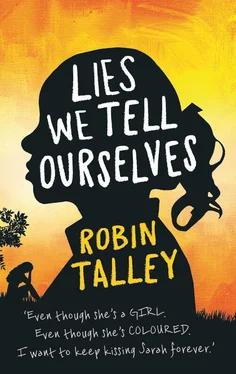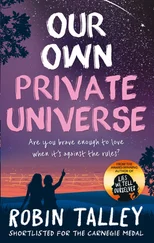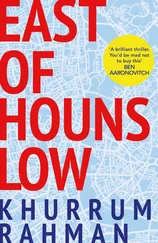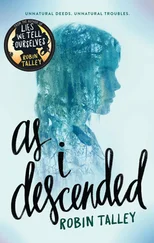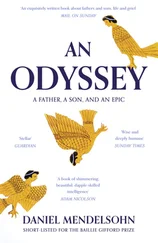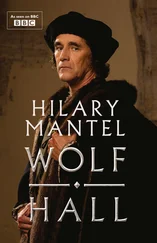Chuck is usually a jokester. The sort of boy everyone likes because he’s funny and nice to everyone. The boy trembling next to me now is somebody else altogether.
Yvonne’s lip quivers. For a minute, we’re all quiet. Then the younger kids start whispering.
“I saw somebody in the hall who said he had a knife.”
“A girl in Gym said she was going to pour gas on us and set us on fire.”
“On TV they said a girl got stabbed in Little Rock.”
“That’s not true,” Mrs. Mullins says. “Anyway, this isn’t Little Rock. Those sorts of things won’t happen here.”
“They were throwing rocks at us,” Ruth says.
“And sticks and pencils,” a sophomore boy says. “One almost stuck me in the eye.”
Mrs. Mullins shakes her head. “It’s because today was the first day. It will die down.”
“I tried to tell a teacher,” the sophomore boy goes on. “She said she couldn’t do anything because no adults saw it happen.”
“Most of the teachers and the administrators won’t be much help, I’m afraid,” Mrs. Mullins says. “But if anything serious happens, if you need a doctor, you should certainly tell your parents right away.”
“Translation,” Chuck mutters so only Ennis, Paulie and I can hear. “Don’t tattle, or the judge will send us all back to our old school. Jim Crow is still alive and well in good old Virginia.”
“Shush,” Ennis tells him.
But I’ve heard Mama and Daddy say that, too. If there’s any sign integration is causing violence, the courts could delay it another year. Then we’d have to go back to Johns High, and the school board lawyers would probably come up with some reason why integration had to be pushed back another year after that. And another, and another. Decades would pass before the next black face showed up at Jefferson High School.
We’ve already been waiting forever. When we filed our lawsuit, two years had passed since the Supreme Court said all the schools in the country had to be integrated.
My family was still living in Chicago when we first heard what the Supreme Court had done. I was only in seventh grade. We moved to Virginia that summer, and I thought when we got here, we’d be going to school with white people.
That was before I understood how hard the white people in the South would fight us. It wasn’t until the next year, when Little Rock integrated its high school and the white people rioted in the streets, that I understood what my family and I had signed on for.
Mama and Daddy signed on to the NAACP’s lawsuit, and for three years, Ruth and I and the other colored children waited. We took tests and went to court and watched white lawyers talk about whether colored children were smart enough to keep up with white children. I sat on a bench in the courtroom and watched the superintendent hold up my file and testify in front of a white-haired judge about how, even though I’d scored in the top 5 percent on the aptitude tests, I wasn’t fit to go to a white school because I’d have “trouble adapting socially.”
Forty Negro kids had applied to transfer to white schools in Davisburg. Some of them changed their minds when they saw what we were up against. Most of the rest got rejected because the school board said they hadn’t passed the tests—even though none of us ever saw a grade book. So now it was down to us ten. We’d done so well on the tests they couldn’t come up with any more excuses. The judge said “trouble adapting socially” wasn’t a good enough reason to keep us at a school where the heaters only worked on the days it wasn’t raining.
The white parents tried to get the decision overturned, and the case went back and forth and back and forth until last summer, when the federal judge ruled Jefferson had to admit us, period.
So the governor shut down all the white schools in Virginia that had been ordered to admit Negroes. He figured if colored people couldn’t go to the white schools, it meant he’d won. He didn’t seem to care that if the white schools were closed, then white people couldn’t go to school, either. The white people called it “Massive Resistance,” because they were doing whatever it took to resist the Supreme Court’s order. When Daddy first saw that newspaper photo of the big locks on the Jefferson High’s front doors he said, “I’ve got to hand it to the governor. I didn’t think he had the nerve.”
Starting last September, the white kids had to find a private school to go to or miss school altogether. But the ten of us did all right. The NAACP tutored us at Mrs. Mullins’s house for free. We studied so much English and History and French and Math and Science no one could accuse us of not keeping up with the white kids.
When Christmas break came and went and the schools were still closed, we’d started to think we might spend the whole year taking classes in Mrs. Mullins’s house. Then, last week, another court said it was illegal for the governor to close the schools just because he felt like it. After five months of sitting empty, Jefferson had to be opened. Even to us.
Daddy says we’re lucky. Down in Prince Edward County, they shut down their entire school system—every single white school and every single colored school, from kindergarten up through twelfth grade—so they wouldn’t have to integrate. The courts can’t do anything about it. So the white parents there used county tax money to set up a private school for their kids to go to, for free. Only the white kids get to go there, though. The Negroes in Prince Edward County don’t have any schools at all. Some of their parents could afford to send them to private schools in other districts, but most of them are sitting at home all day, reading whatever books their parents can scrounge up for them and hoping they’ll wind up with enough education to get a job someday.
“Sarah, honey, do you want me to help you with your hair?” a quiet voice says behind me.
I turn, startled. Miss Freeman, Mrs. Mullins’s younger sister, is smiling at me.
I’d forgotten all about the milk in my hair. After Mama took all that time to wash it last night, too. I must be stinking up the house for Miss Freeman to mention it.
“Thank you, ma’am.” I get up and follow her to the bathroom.
“I’m sure looking forward to seeing you sing at church this Sunday,” Miss Freeman says as she closes the door behind us and pulls pins out of my hair. Her voice is soft and pleasant. I ignore the way she’s yanking at my scalp because it’s so nice to hear someone talk about something that’s not integration. “What’s the anthem this week?”
It takes me a minute to remember. “‘Light Rises in the Darkness.’”
“Oh, that’ll be real pretty. Do you have a solo?”
I wince at another sharp tug. “Not this time.”
“Well, I hope you have one soon. I loved it when you sang on Christmas Eve.” There’s a pause in the yanking. “You know, why don’t I go see if I can find you a clean blouse to wear home. We’ll put this one in the wash.”
She leaves. The milk stain must be bad. I twist around to see it in the bathroom mirror. Sure enough, a broad swath of yellow runs all the way down the back of my blouse. Revolting. Below it are two holes in the fabric where the boy poked me with pencils in the auditorium. I press my fingers against the spot and feel a tender bruise.
A tear pricks at my eye, but I squeeze my lids shut. I can’t give in to tears. If anyone saw, they’d think I was just another weak colored girl. That I couldn’t handle this.
The door opens. I try to put on a smile for Miss Freeman, but it’s just Ruth.
She gazes at my reflection in the mirror. “What happened?”
“Nothing. Somebody accidentally spilled some milk on me.”
Читать дальше
